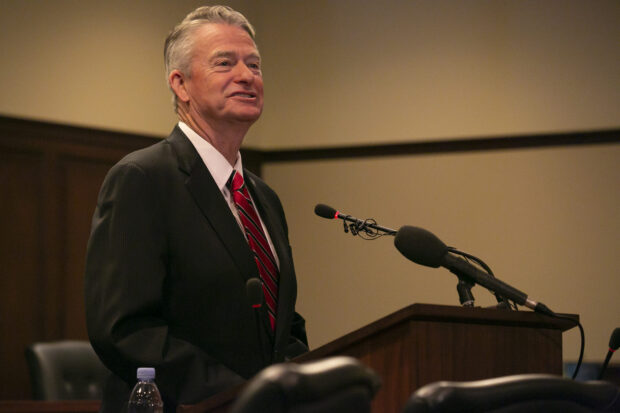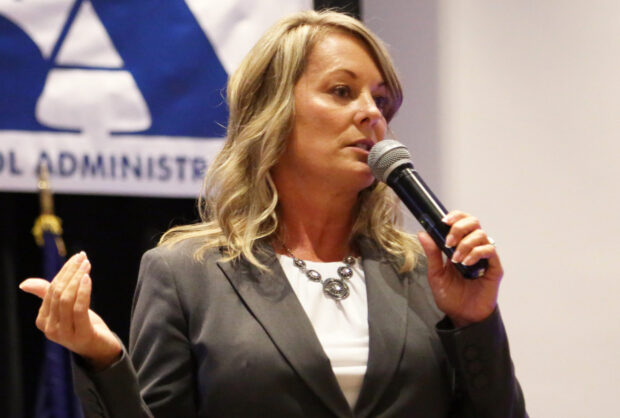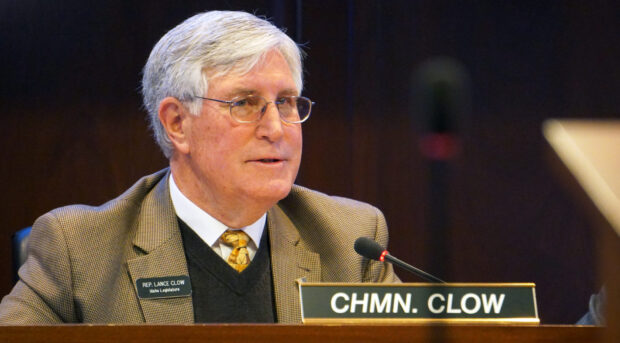The House Education Committee introduced a new bill Wednesday that would phase out the master educator premium financial incentive program for teachers.
Gov. Brad Little’s staff pushed the new bill, which they said was designed to complement Little and the Legislature’s effort to increase veteran teacher salaries by building out the career ladder salary allocation system over the next five years.

For background, the master educator premiums were created by the Legislature to provide a $4,000 financial bonus meant to reward the state’s highest-performing veteran teachers. Educators who earn the three-year renewable premiums will claim $12,000.
The bill would make several changes if passed into law:
- It would allow the state to accept one final round of applications for master educator premiums this year.
- After this year, no new MEP applications would be accepted.
- It would allow the state to continue paying out premiums for teachers that earned them last year and earn them this year.
- Then it would repeal the master educator premium from law by July 1, 2024, once all the premiums have been paid out.
- It would also clarify the reporting requirements reviewed for the professional and advanced professional performance criteria on the career ladder, including the data on students meeting measurable student achievement targets.
- Finally, it sets a deadline of Nov. 1 for the State Board of Education to complete the audit of teacher evaluations.
“This bill would ensure we fulfill the promises to the teachers who applied for the master educator premium last year and allow educators who are in the application process this year to complete their work,” said Greg Wilson, Little’s education liaison.
Wednesday’s hearing was only an introductory hearing, so there was no debate or public testimony.
In the first year of the MEP program, the state awarded premiums to 1,307 of the 1,397 teachers who applied. The program rollout was marked by delays and uncertainty.
Several educators said the portfolio application process was burdensome and time-consuming, often taking 80-120 hours to complete. Several of Idaho’s most dedicated teachers did not apply, including 2019 Teacher of the Year Marc Beitia, and Sonia Galaviz, a Boise teacher who won the National Education Association’s 2017 Horace Mann Award for Teaching Excellence.
While the state would phase out the master educator premium program, Little’s staff said the five-year, $223 million teacher pay proposal represents the governor’s ongoing effort to financially reward Idaho’s most effective and experienced educators.
Introducing the new bill clears the way for it to return to House Education for a full hearing during what could be the final days of the legislative session.
State Department of Education duties
A late-session showdown over the nuances of policy-setting and budget-writing could be brewing in the Legislature.

And it involves the House Education Committee sparring with the Joint Finance-Appropriations Committee over the roles and responsibilities of state superintendent Sherri Ybarra’s State Department of Education.
On Wednesday, House Education Committee Chairman Lance Clow, R-Twin Falls, introduced a new bill that would write into state law that the SDE has responsibility to administer the Idaho System for Education Excellence (ISEE), a crucial education data system.
Clow said his bill “deals with what I would describe as some confusion in state law as to who has responsibility for what, especially when it comes to information services.”
Clow’s bill appears to be a response to JFAC’s March 3 action to move the SDE’s IT and data management programs to the State Board of Education.
There are serious stakes, too. JFAC’s move, handled through the budgeting process, would take $2.7 million and 18 full-time positions away from the SDE and given it to the State Board.

Clow’s bill could block that.
“The key here is that ISEE be under the purview of the department of education,” Clow said. “That data is needed on a daily basis by the department and schools, and people are constantly back and forth on that information and the state department really needs that.”
Clow’s move isn’t coming out of nowhere. Before JFAC set the public school budget this year, Clow appealed to the joint budget committee to respect the difference between policy writing and appropriating money.
“Leave the policy to your germane committees,” Clow told JFAC on Feb. 12, using legislative lingo to describe policymaking committees such as House Education.
There was little discussion and no public testimony over the bill Wednesday.
Introducing Clow’s new bill clears the way for it to return to House Education for a full-hearing. It also sets up the possibility for some more late-session fireworks in a session that has featured numerous power struggles.
Idaho Opportunity Scholarship
Without any debate, a divided House approved funding for a popular state scholarship Wednesday.
In line with Gov. Brad Little’s recommendation, Senate Bill 1382 includes $7 million in new funding for the Idaho Opportunity Scholarship, taking the entire appropriation to $26 million.
The State Board of Education special programs budget also included funding for five other state programs or initiatives.
The Idaho Opportunity Scholarship is a need- and merit-based scholarship available to high school graduates and adults looking to complete their college education. It provides up to $3,500 per year for eligible students attending Idaho colleges or universities.
Even with the $26 million, the scholarship can’t keep up with demand. Last year, 5,261 eligible students applied, and the state approved scholarships for 3,956 students.
Despite its popularity and the state’s focus on increasing go-on rates and the percentage of Idahoans with postsecondary education, the scholarship has proved controversial for the Legislature.
Twenty-Two House members voted against funding the scholarship Wednesday, but none of them debated or explained their vote. The Idaho Freedom Foundation and some conservative legislators questioned whether “Dreamers” who fall under the Deferred Action for Childhood Arrivals program should receive the scholarship.
Many conservative legislators also voted against expanding the scholarship to include adults in 2018. That measure narrowly passed 37-32 two years ago.
Nevertheless, the budget bill passed 44-22. It heads to Little’s desk for his signature next. It previously passed the Senate 26-5 on March 5.
Community colleges budget
The Idaho House also approved the community colleges budget without any debate during a fast-moving morning floor session Wednesday.
Senate Bill 1383, the $48.2 million community college budget, includes funding for College of Eastern Idaho, College of Western Idaho, College of Southern Idaho, North Idaho College and systemwide programs.
Ongoing general funding is reduced by 2 percent in line with Little’s budget holdbacks, and the total budget represents a .9 percent decrease compared to a year ago.
The community college budget fared much better than the higher education budget, which the House killed on the floor Monday.
The community college budget passed 64-1. Only Rep. Dorothy Moon, a Stanley Republican who sits on the House Education Committee, voted against it.
Senate Bill 1383 heads next to Little’s desk for his signature. It passed the Senate 31-0 on March 5.
STEM Action Center
The House also approved the STEM Action Center budget Wednesday.
Senate Bill 1381 includes $3 million in general fund spending, representing a 17 percent increase compared to a year ago. The budget includes a 2 percent reduction in ongoing general fund spending, in line with Little’s budget reductions. But it also includes funding for a new line item, $500,000 for computer science grants.
The STEM Action Center was created by the Legislature to promote the STEM disciplines of science, technology, engineering and math. Last year, it serviced 35,000 people by offering STEM courses for students and teachers across the state, sponsoring Rep. Sally Toone, D-Gooding, said.
Senate Bill 1381 heads next to Little’s desk for his consideration. It passed the Senate 28-3 back on March 5.
